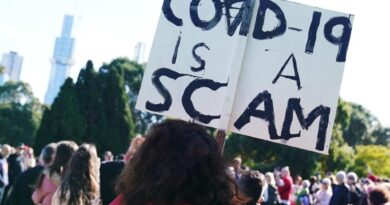State Violence to Remedy the Covid-19 “Climate Crisis”. Bertold Brecht’s “Measures Against Violence”

The crisis year 1930 was the beginning of the end of the Weimar Republic, the first parliamentary democracy in Germany: three million unemployed, emergency decrees and Hitler’s triumph. It was the beginning of a dark period. In the parable “Measures against Violence”, Brecht drew attention early on to the danger of arbitrariness and violence under National Socialism. Parallels to the world political situation of the present immediately leap to the eye of every alert citizen. Reflecting on Brecht’s parable on dealing with state violence from 1930 can therefore be helpful.
State violence measures to remedy the COVID 19 and climate crisis
Violence is still being done to us today – and there is no end in sight. The COVID-19 crisis will be followed by the climate crisis. And we citizens are backing away from the violence of the governments’ imposed illegal and brutal measures to protect all of our health, not saying “no”. We are already beginning to come to terms with the tyranny that is coming.
Will we continue to submit to state violence because, like Mr Keuner in Brecht’s parable, we have “no backbone to break”? Will we obey and serve the agents of a foreign power for years because we are waiting for the right time to say “no” like Mr Egge?
On the basis of Brecht’s parable, every adult citizen should deal with the topic and come to the realisation of sensible and considered action through independent thinking.
Brecht’s parable from 1930
 In his instructive short story based on a comparison, Brecht describes how the two main characters, Mr Keuner and Mr Egge, react in their own way to state violence: Mr Keuner – the thinking man – justifies his submissive reaction to violence towards his students by saying, “I have no backbone to smash. I of all people must live longer than violence.” (1)
In his instructive short story based on a comparison, Brecht describes how the two main characters, Mr Keuner and Mr Egge, react in their own way to state violence: Mr Keuner – the thinking man – justifies his submissive reaction to violence towards his students by saying, “I have no backbone to smash. I of all people must live longer than violence.” (1)
Mr Keuner then lectures his pupils by means of a brutal story from the time of illegality: one day an agent of the new rulers of the city enters Mr Egge’s house and life without being asked. This foreign agent obeys and serves Mr Egge, “who had learned to say no”, for seven years – but does not speak a single word to him. Only after his death does he breathe a sigh of relief and answer the agent’s question of seven years ago, “Will you serve me?” with a “No”.
Perhaps it is the lesser evil to resign oneself to fate, not to offer open resistance and also not to speak one’s mind openly when one has realised that at the moment one does not have the power to do anything about the violence. Perhaps it is wiser to wait for the right time to say “no”.
But, dear reader, form your own opinion. I quote:
“When Mr Keuner, the thinker, spoke out against violence in front of many in a hall, he noticed how people backed away from him and walked away. He looked around and saw standing behind him – violence. ‘What did you say?’ the violence asked him. ‘I spoke in favour of the violence,’ Mr Keuner replied. When Mr Keuner had walked away, his pupils asked him about his backbone. Mr Keuner replied, ‘I have no backbone to smash. I of all people must live longer than violence.’
And Mr Keuner told the following story:
In the flat of Mr Egge, who had learned to say no, an agent came one day in the time of illegality, who produced a note which was issued in the name of those who ruled the city, and on which it was written that every flat in which he set foot should belong to him; likewise also every meal he demanded should belong to him; likewise also every man he saw should serve him. The agent sat down in a chair, demanded food, washed himself, lay down, and, facing the wall before falling asleep, asked, ‘Will you serve me?’
Mr Egge covered him with a blanket, drove away the flies, guarded his sleep, and as on that day, he obeyed him for seven years. But whatever he did for him, there was one thing he was careful not to do: that was to say a word.
When the seven years were up and the agent had grown fat from eating, sleeping and giving orders, the agent died. Then Mr Egge wrapped him in the rotten blanket, dragged him out of the house, washed the camp, whitewashed the walls, breathed a sigh of relief and answered: ‘No.’” (2)
*
Note to readers: Please click the share buttons above or below. Follow us on Instagram, @crg_globalresearch. Forward this article to your email lists. Crosspost on your blog site, internet forums. etc.
Dr Rudolf Hänsel is a retired rector, educationalist and qualified psychologist.
He is a frequent contributor to Global Research.
Notes
- https://www.kripahle-online.de/unterricht/wp-content/uploads/2010/12/Maßnahmen-gegen-die-Gewalt.pdf
- op. cit.
Featured image is licensed under CC BY-SA 3.0 de
*** This article has been archived for your research. The original version from Global Research can be found here ***


